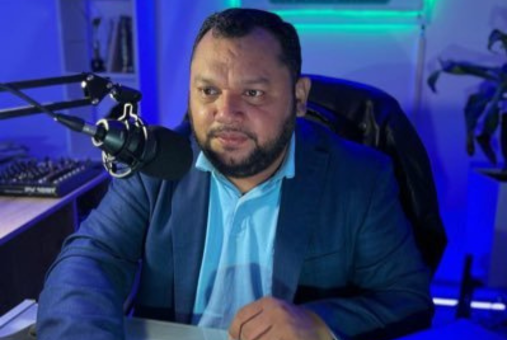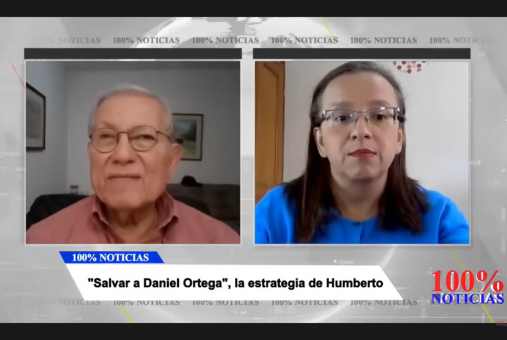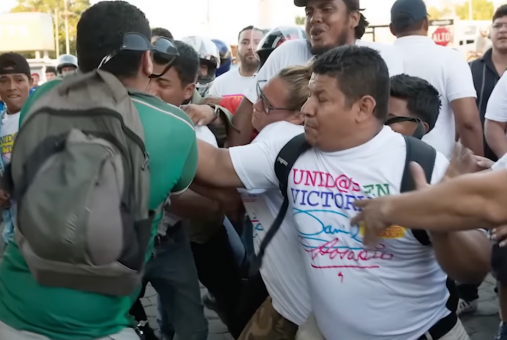In May of this year, media outlets 100% Noticias and Despacho 505, which report on Nicaragua from exile, began a campaign on social networks to promote the use of a VPN (virtual private network). Through videos, the media warn about proposed laws that could put digital rights, online privacy and safe internet browsing at risk.
“We launched a campaign for the use of VPN, we are educating people to do safe browsing,” Lucía Pineda, director of 100% Noticias, told LatAm Journalism Review (LJR). “We have been doing that digital literacy, that type of specific campaign, right now with the use of VPN.”
One of the proposed laws that the campaign refers to is the General Law of Convergent Telecommunications, sent by President Daniel Ortega to the National Assembly of Nicaragua on March 5, which would replace the General Law of Telecommunications and Post Offices, which has been in force in the Central American country since 1995.
According to experts, the proposed law would facilitate authorities' access to browsing and personal data of internet users, in addition to establishing mechanisms to force telecommunications operators –including media outlets– to request licenses and pay a percentage of their income to be able to operate in Nicaragua.
¡Tu privacidad en la navegación de internet importa! Con una VPN, oculta tus actividades en línea y evita ciberataques en Nicaragua. Mantente protegido con una conexión segura. pic.twitter.com/x7A7VzAEO5
— 100%NOTICIAS (@100noticiasni) May 14, 2024
But in addition, the approval of this bill would also represent new obstacles for journalism and press freedom in Nicaragua, as anticipated by independent journalists from that country. Among these feared obstacles are the regulation of digital content, the blocking of websites in Nicaraguan territory and the control of audiovisual production equipment.
Given this, other independent media that operate from outside the country are already planning campaigns similar to those of 100% Noticias y Despacho 505 to raise awareness among their readers about the use of VPNs and train them in ways to circumvent possible blockings to continue consuming information in case the proposed law takes effect.
A VPN allows a user to create a private connection between their device and the internet. Its main function is to protect online privacy, hiding the user's IP address, allowing them to browse anonymously and securely, access geo-blocked content, and protect information on public Wi-Fi networks.
“What we are foreseeing is that if there is a will to block media, something similar to the experience of Venezuela could happen: the particular blocking of websites, of web addresses,” Álvaro Navarro, director of digital media outlet Artículo 66, told LatAm Journalism Review (LJR). “This law could be the beginning of that. We have also been in contact with Venezuelan colleagues to know how to act in technical terms, including how we are going to campaign [on the use of VPN]. We also have to train ourselves, and I think that is the enormous challenge.”
Arlen Pérez is editor at La Prensa, the oldest newspaper in Nicaragua at 98 years old and which currently operates exclusively online and from exile. She also said that if the proposed law is approved, it will be essential to train both journalists on digital security issues, as well as Nicaraguans on how to consume information in the face of possible blockings.
At least 253 journalists and media workers from Nicaragua have been forced into exile as of April of this year, while at least 56 media outlets have been closed or confiscated by the Ortega regime in the last six years, according to the Observatory from the organization Independent Journalists and Communicators of Nicaragua (PCIN, for its acronym in Spanish), of which Pérez is coordinator.
This has worsened the situation of silence around the news in Nicaragua, in which any narrative different from that of the Ortega government and his wife and vice president, Rosario Murillo, is the target of reprisals.
“We should analyze starting to train people to use VPN, so that if, as this law says, there is going to be IP control, you find a way to use VPN so you can bypass this control,” Pérez told LJR. “This even has to go through an awareness campaign in which the audience knows that silence against us is actually deafness against them. They are also imposing a restriction on them, so they are going to have to participate a little.”
The General Law of Convergent Telecommunications incorporates audiovisual content within the Telecommunications Services that would be regulated. The bill, to which LJR had access, defines audiovisual content as “Open Television, Subscription or Pay Television, Sound Broadcasting in Amplitude Modulation (AM) or Frequency Modulation (FM), as well as any other service for the dissemination of audiovisual content using any technology or transmission medium, including the internet."
For Pérez, this proposed law would allow the Nicaraguan Institute of Telecommunications and Postal Services (TELCOR), the regulatory body for telecommunications and postal services in Nicaragua, to extend over the internet the control it already has over radio, television and telecommunications.

Journalist Álvaro Navarro said that it is not in the best interest of the Ortega regime to mess with technology companies. (Photo: Twitter of Álvaro Navarro)
“This is how – with these types of laws and through TELCOR – the television channels started to disappear,” Pérez said. “With this new law, they extend the issue to audiovisual content and also extend it to the internet. So what's the problem with us journalists? That the only thing we have left is the internet."
The journalist said that it would still be necessary to analyze the regulations established by TELCOR to adjust to the proposed legislation, if it is approved. However, there is concern among journalists that the ambiguity with which the initiative is written lends itself to arbitrary interpretations by the Ortega regime, as has happened with other laws currently in force.
Such is the case of the Cybercrime Law, approved in 2020, which punishes crimes committed “through information and communication technologies to the detriment of natural or legal persons.” However, that law has been used to accuse journalists and activists of spreading false news.
“The Cybercrime Law talks about information through the media, telecommunications, but at no time does it say anything about false news. They are applying the Cybercrime Law to their liking and whim to be able to imprison people for more than 13 years,” Pérez said. “The government has been making very ambiguous laws for a long time. [...] Generally the two crimes they use are 'treason,’ and who defines treason? Or 'undermining national integrity,’ who defines national integrity?"
Nicaraguan news outlets that are legally established in other countries are confident that some of the measures and restrictions of the proposed law, such as the collection of fees or the need to apply for a license to operate, would not directly affect them.
That’s not the case with consumption of its content within Nicaragua, which could be restricted by the possible blocking of its websites. That is why the question for journalists operating from exile is how this proposed law would limit the entry of their content into Nicaragua and what other alternatives exist in case their websites are blocked.
The answer for several of them is social networks.
“We generate our content from outside and people see it and have access through social networks,” Pineda said. “If there is such a thing as blocking specific websites, the option we can have and have had is to distribute all the content through social networks.”
Pineda does not believe that the proposed law would restrict access to the main social networks in Nicaragua, such as Facebook, X, YouTube or TikTok, since the same regime uses some of these platforms to spread its messages.
Navarro agreed and said that it is not in the interest of the Ortega regime to mess with the technology giants.
“The family of the Nicaraguan dictatorship also has media, their messages are also spread through social networks. They are involved in the business, in very basic terms. That's why I say, trying to block social media would be shooting yourself in the foot,” Navarro said. “They won't be able to block my YouTube channel either because that would mean blocking all of YouTube in the country.”
Media such as Artículo 66 have already consolidated a large part of their audience on social networks. According to Navarro, 40 percent of the traffic that comes to the outlet’s website comes from platforms such as Facebook, X and Instagram.
In the case of 100% Noticias, since the Ortega regime confiscated its equipment and facilities and took its signal off the air, it has turned to Facebook, X and Instagram to distribute much of its content. In addition, the media outlet currently broadcasts its news programs and talk shows through YouTube, and has a Telegram channel.

100% Noticias broadcasts its news and talk shows on YouTube since its signal was taken off the air in Nicaragua. (Photo: Screenshot of 100% Noticias on YouTube)
“Right now what the media are doing is not putting all their eggs in one basket,” Pérez said. "You can have an internet site, that is, your official website, but you also have your social networks, your WhatsApp channels, your Telegram channels, so in some way it is like 'if you close a door on me, here I have some three more windows.'”
In financial terms, the journalists believe that the possible blocking of their websites would not have a great impact on their media's income either. Since they started operating from exile, practically all of their Nicaraguan advertisers have withdrawn their advertising for fear of government reprisals.
Currently, both Artículo 66 and 100% Noticias and the majority of Nicaraguan digital media in exile have grants and funds from international organizations as their main source of income, with a smaller percentage coming from Google Ads on their website and monetization of content on their social networks, according to Pineda and Navarro.
“We have the YouTube monetization system because it pays you a little better compared to the website monetization system,” Pineda said. “Yes, it is because some type of monetization affects us, I think it will be minimal because within Nicaragua monetization is minimal.”
In the case of La Prensa, its business model is based on a membership program and digital advertising, and it has begun to implement the first steps towards a more diversified business model, which includes the sale of editorial products.
“If you advertise in an independent media outlet, you are also a traitor to the country,” Pérez said. “We lost more than 90 percent of our advertisers precisely because of that, because it was not only criminalizing the exercise of journalism, it was criminalizing journalism as an advertising platform.”
However, Navarro said that, in addition to the fact that monetizing news content on social networks is not yet very profitable, having a website provides a certain extra degree of credibility with the audience compared to media that live solely on social networks.
“Websites translate into a higher level of trust from the audience,” Navarro said. “[In case the website is blocked] we are going to have to see along the way what mechanism we could use to have the same level of credibility, of trust in people while continuing to inform. We are going to have to try to be much more creative, to present graphic information."
The effects that, if approved, the General Law of Convergent Telecommunications could have would impact not only journalists, but also content creators and even citizens.
The bill includes a section dedicated to telecommunications equipment, which establishes that the manufacturing, import and commercialization of this equipment must go through an approval process before TELCOR. Article 66 of the document indicates that it will be up to the regulatory body to “establish restriction measures and prohibitions on the importation of telecommunications equipment that put national security and/or the interests of the Republic of Nicaragua at risk.”
According to Pérez, these equipment could include multimedia production equipment, editing equipment, and even cameras and cell phones. For this reason, the journalist fears that with this law, the Nicaraguan government will seek to have more control over what type of cell phones and cameras circulate in the country.
“It does not surprise me that this law includes the topic of equipment, because the journalist who is detained, Victor Ticay, is detained for making a recording with his cell phone and publishing it on Facebook. And I’m not saying [that he recorded] a protest, I’m talking about a Holy Week procession,” Pérez said. “In the end, in Nicaragua no one can have a camera anymore because it is a threat.”

According to Arlen Pérez, anyone who documents with a camera or phone what is happening in Nicaragua could be subject to reprisals. (Photo: Confidencial screenshot on YouTube, under CC BY 2.0)
Pérez said these restrictions would directly affect content creators and citizens who try to document what is happening in the country. The journalist said that, since there are no longer any journalism schools outside the control of the regime, those who in the medium term could carry out the task of reporting are precisely the content creators who don’t have university education, but who have communication and multimedia production skills.
However, the measures of this proposed law could also put that activity at risk.
“No one is going to want to touch a camera anymore, no one is going to want to touch an editing program, no one is going to want to handle online content anymore,” Pérez said. "What these laws seek is to create silence so that the only discourse that will be heard is the government's, that of Daniel Ortega and Rosario Murillo."
The journalists consulted agree that there is uncertainty about what could happen with the bill, since almost three months have passed since it was sent to the National Assembly, when previously, other bills promoted by Ortega have been approved quickly.
However, Navarro believes that the regime is taking time to analyze how politically expedient approval would be.
“I think the fact that they haven't approved it yet doesn't really depend on a reasonable institutional process,” the journalist said. “They already have a political decision and what they will be seeing is nothing more than whether it is worth it.”
Navarro said that even if it is not approved, many of the restrictive measures indicated in the initiative already happen in reality. That is why he does not rule out that the proposal is part of the regime's strategies to distract journalists from their informative work.
“While I am trying to find mechanisms to avoid censorship, then I stop making news and they know it,” he said. “What I do believe that they are surely going to execute is the control of the websites [...]. In the short term, the greatest impact would be on that, because it means we have to dedicate effort, time and resources to circumvent that part.”
LJR contacted TELCOR with the Education, Culture, Sports and Social Media Commission of the National Assembly of Nicaragua, but as of the publication of this article neither had responded to interview requests.